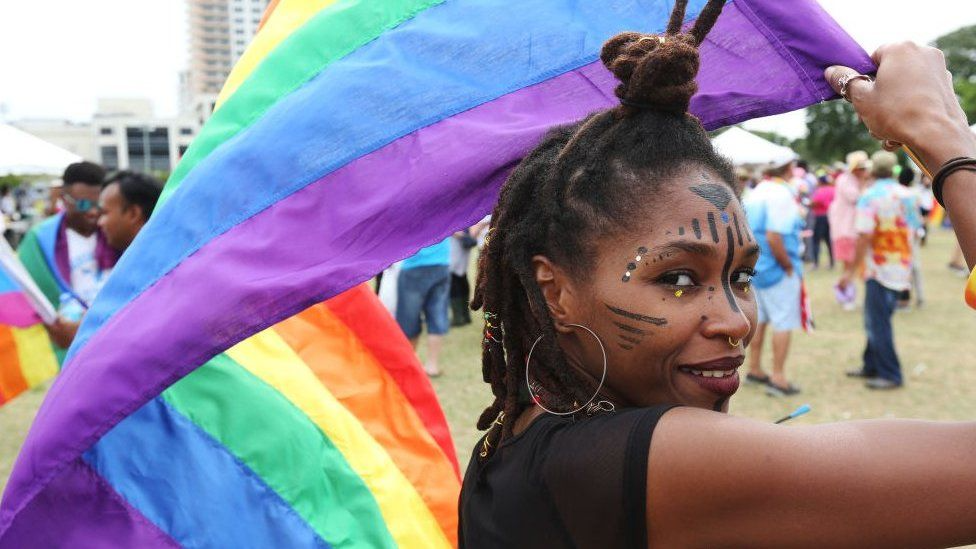Antigua’s ban on same-sex acts ruled unconstitutional
A law criminalising same-sex acts between consenting adults in Antigua and Barbuda has been declared unconstitutional. The country’s high court ruled on Tuesday that the law contravened constitutionally guaranteed rights to liberty, freedom of expression and protection of personal privacy. Campaigners say it is a major victory in a country where homophobia is rife. The case was brought by a gay man in sync with two rights groups.
The two groups, Women Against Rape and the Eastern Caribbean Alliance for Diversity and Equality (ECADE), have welcomed the ruling against the Sexual Offences Act 1995. The 1995 Act has its roots in British colonial-era legislation that forbids “buggery” and “indecency” and hopes are now high that the ruling will pave the way for similar moves in neighbouring islands.
“We are very much hoping the Antigua ruling will prompt other legal systems in the Caribbean to review their laws and policies, and how they impact on vulnerable populations,” Women Against Rape President Alexandrina Wong told the BBC.
ECADE says seven Caribbean countries still have versions of statutes that prohibit same-sex intimacy. Although rarely enforced, campaigners say they marginalise LGBTQ people, while tacitly sanctioning violence and discrimination against them.
Florida teen killed by man who feared being outed as gay
A Florida teenager fatally shot another teen because he feared being outed as gay, police in Daytona Beach said. Jakari Webb, 19, was arrested Wednesday in connection with the shooting death of Telan Mann, (pictured), also 19, in the early hours of June 23, police said.
Officers arrived on the scene after hearing gunshots while patrolling the area and found Mann on the sidewalk “in a pool of blood and with multiple bullet wounds on his body,” police said. The two had been talking to each other on social media since February, according to police, and they had planned to meet for the first time on June 23 just a few blocks from Mann’s home. Police said it was during that first encounter that Webb shot Mann.
“There was some concern that Telan either had or was going to post something on social media kind of outing the suspect,” Daytona Beach Police Chief Jakari Young said at a news conference Wednesday.
First same-sex weddings take place in Switzerland
Alois Carnier, 57, and Peter Leu, 67, said “wholeheartedly, I do” to each other this week as same-sex marriages became legal in Switzerland. It is the first time two men have walked out of the civil registry in their town of Schaffhausen as husband and husband.
Voters approved the “Marriage for All” initiative by a nearly two-thirds majority last September, making Switzerland one of the last countries in Western Europe to legalize same-sex marriage.
“The ceremony was really very important to me because this has been 20 years in the making,” said Carnier, who entered into a registered partnership with Leu in 2014 and has been active in a decades-long campaign to recognize gay rights. Across the country in Geneva, Aline, 46, and Laure, 45, also tied the knot after being together for 21 years. They have a four-year-old son and, like Leu and Carnier, they had previously been in a civil partnership.
“In every sense, this is a new stage (for us),” said Laure, a human resources specialist who like her partner declined to give her family name.
US state of Alabama cites abortion ruling in transgender medication case
Days after the U.S. Supreme Court ruled that states can prohibit abortion, Alabama has seized on the decision to argue that the state should also be able to ban gender-affirming medical treatments for transgender youth.
The case marks one of the first known instances in which a conservative state has tried to apply the abortion ruling to other realms, just as LGBTQ advocates and others were afraid would happen.
Critics have expressed fear that the legal reasoning behind the high court ruling could lead to a rollback of decisions involving such matters as gay marriage and birth control. The state is asking a federal appeals court to lift an injunction and let it enforce an Alabama law that would make it a felony to give puberty blockers or hormones to transgender minors to help affirm their gender identity.
In its historic ruling last Friday, the U.S. Supreme Court said terminating a pregnancy is not a fundamental constitutional right because abortion is not mentioned in the Constitution and is not “deeply rooted in this nation’s history and tradition.”
In a brief filed Monday, the Alabama attorney general’s office argued similarly that gender transition treatments are not “deeply rooted in our history or traditions,” and thus the state has the authority to ban them. Alabama contends such treatments are dangerous and experimental, a view disputed by medical organizations.
Shannon Minter, legal director of the National Center for Lesbian Rights, said it is the first case he is aware of in which a state cited the abortion ruling on another issue, but added, “It won’t be the last.”
